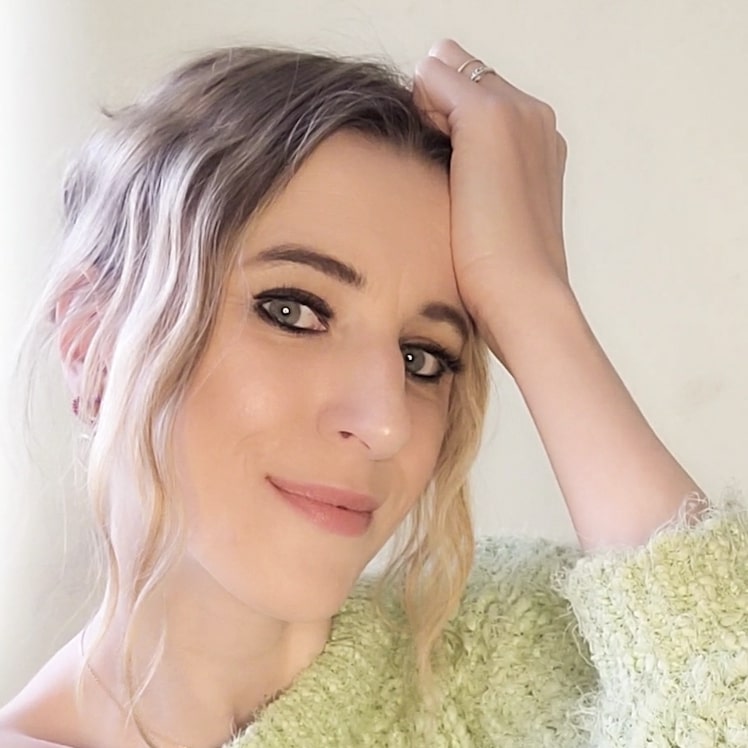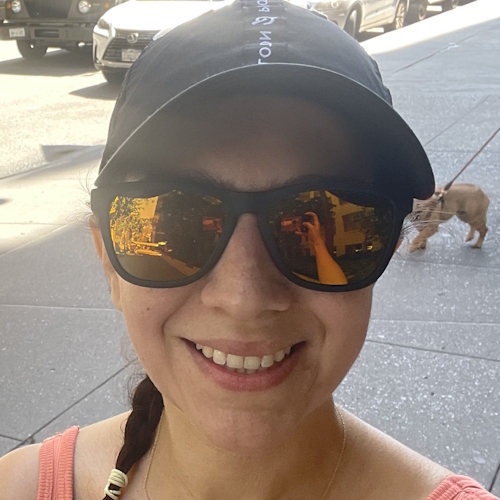Faye Louise’s Rare Appendix Cancer Story
Interviewed by: Taylor Scheib
Edited by: Chris Sanchez
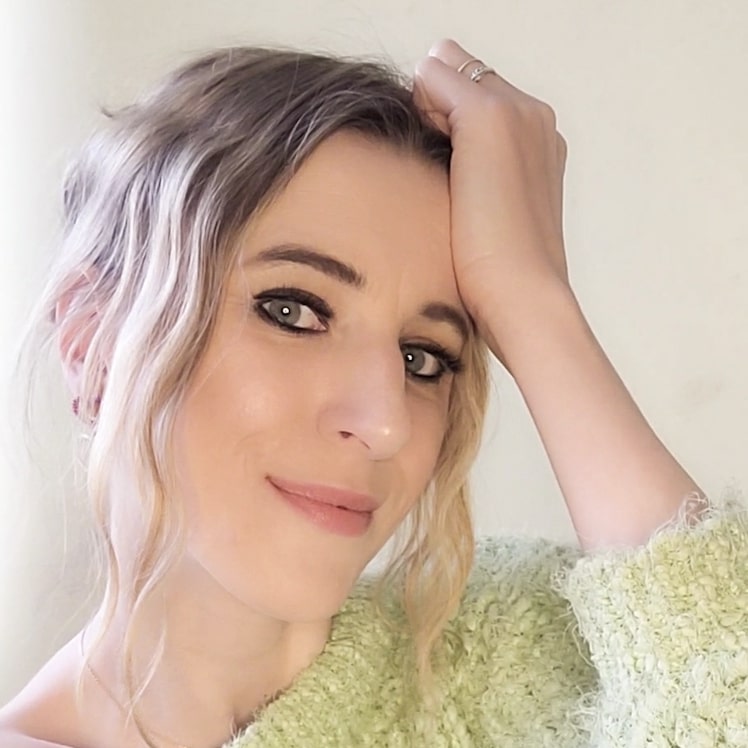
Faye is in recovery from surgery for a rare appendix cancer called pseudomyxoma peritonei, and she is eager to share her story to help others who may be struggling with the same or similar health concerns.
Faye’s appendix cancer was discovered entirely by accident, in the course of treatment for an ovarian cyst. Though she has a family history of cancer—her mother having succumbed to bowel cancer just a couple of years ago—she did not expect her diagnosis, much less that she would have this particular kind of cancer.
Faye underwent what she refers to as “the mother of all surgeries”, HIPEC, during which 8 of her organs were removed and heated chemotherapy applied directly inside her abdomen, among other procedures performed. She was declared NED (no evidence of disease) afterwards.
However, Faye is not out of the woods yet. Her recovery has been slow and has had its ups and downs. Moreover, she still does have a long way to go; she will need to undergo scans for the next 20 years, with her first scan this coming November.
Despite her situation, Faye has found reasons to be positive and happy—and she is also driven to make a difference. She shares her story with us as part of her ongoing initiative to shed light on this rare kind of cancer and to let fellow patients know that they are not alone in their journey.
- Name: Faye L.
- Diagnosis:
- Pseudomyxoma peritonei (rare appendix cancer). Low Grade Muccinous Neoplasm of the appendix
- Initial Symptoms:
- Severe bloating
- Bad stomachache, especially after eating spicy food
- Elevated CA 125 levels and tumor markers (attributed to an ovarian cyst)
- Treatment:
- Hyperthermic intraperitoneal chemotherapy (HIPEC) surgery; removal of spleen, gallbladder, appendix, ovaries, uterus, womb, fallopian tubes, belly button
- Chemotherapy used: mitomycin C
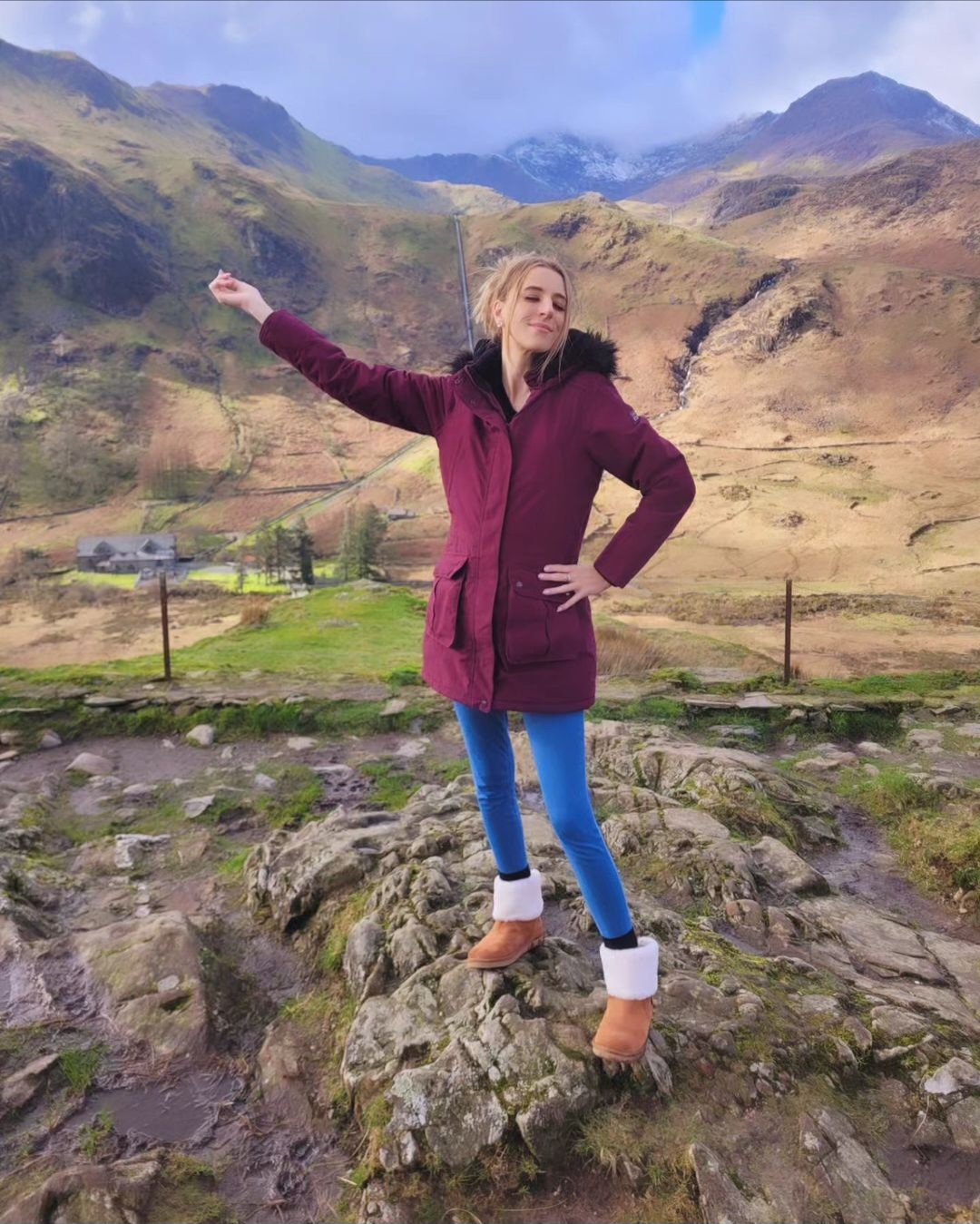
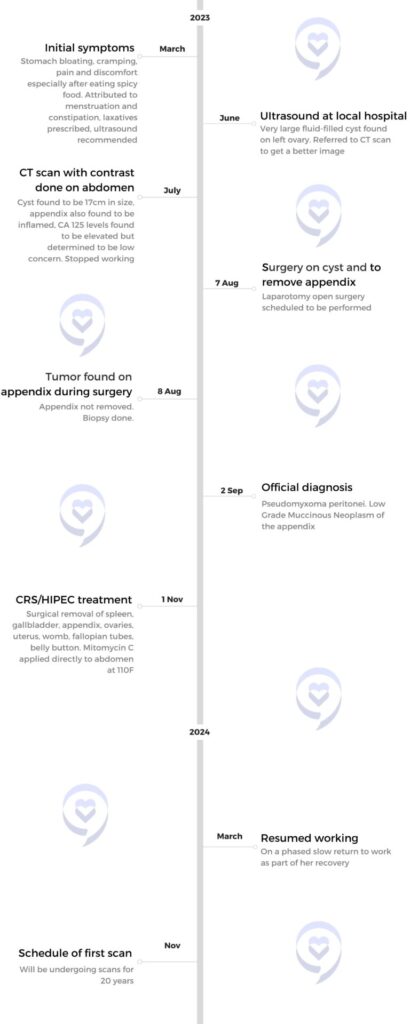
This interview has been edited for clarity. This is not medical advice. Please consult with your healthcare provider for treatment decisions.
… I appreciate waking up every day getting to see flowers or the sky, and it’s just minute little details now that you really do notice.
… You know, you just take in a lot more when you’ve had to fight for your life, which is what I’ve had to do.
Introduction
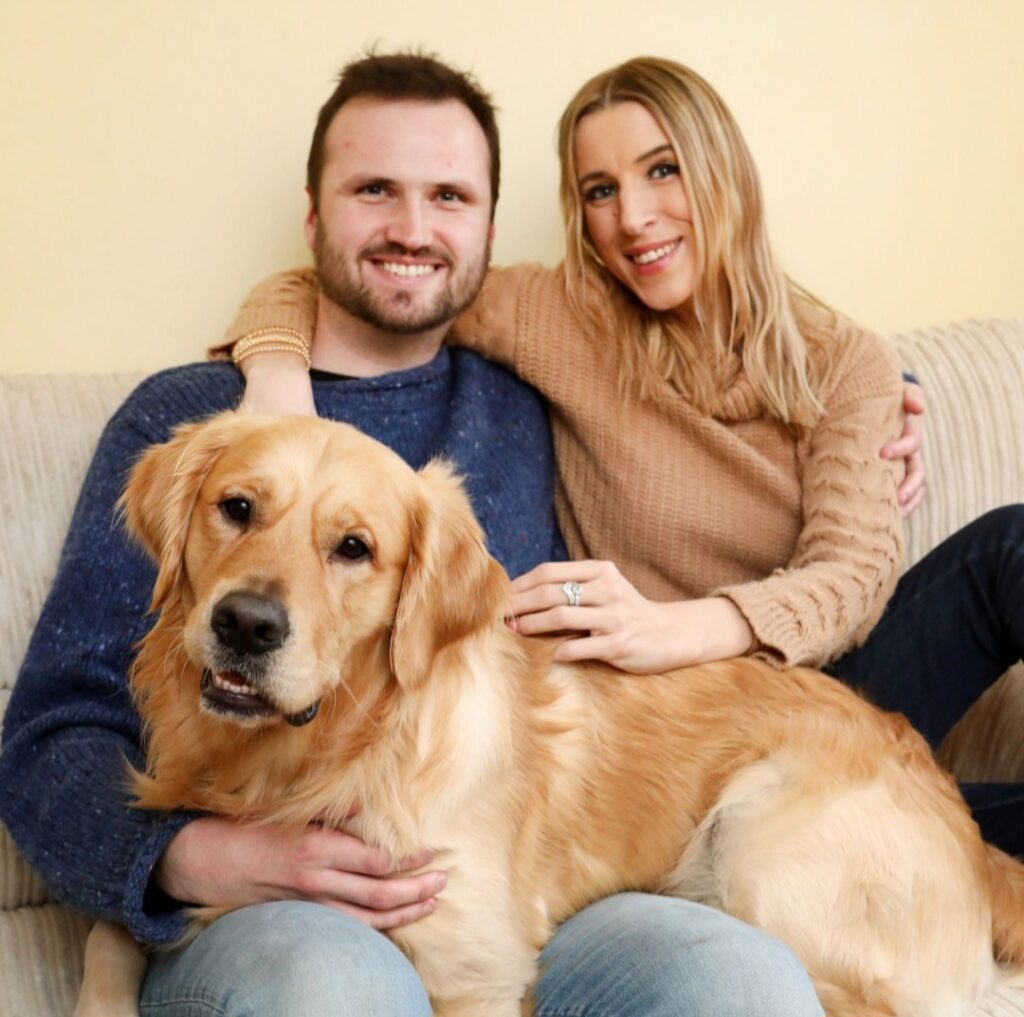
My name is Faye and I am from the United Kingdom.
I’m 39 years of age and I was diagnosed with a very rare form of appendix tumor called pseudomyxoma peritonei.
This is around a 2 to 3 in a million per year diagnosis, which obviously makes it extremely rare.
It behaves in a very strange way. I had it for 5 years and I didn’t know it was there.
It’s not your normal cancer where you’ll get nausea, you’ll feel the sickness, you’ll go, hold on, I’m not well here. It wasn’t like that for me.
Before diagnosis, I always loved to be active, traveling, going out with my dog and my partner, and just enjoying life.
Pre-diagnosis
Ovarian cyst
I just went in for an ovarian cyst which had grown to 17cm on my ovary. And then I came home with a cancer diagnosis. It was totally unexpected. It was a shock.
The only thing that was causing me problems was the cyst itself, bloating, tummy ache. And I just thought it was my period pains.
So my ovarian cyst made me very, very bloated. I was having severe stomach ache. When I ate, I’d feel full quite quickly like I’ve really bloated out, and I’ve not really eaten that much. And having tummy ache after I’d eaten certain foods like spicy foods I found didn’t agree with me anymore.
I also had elevated CA 125 levels and tumor markers. But the cyst can cause the CA 125 to be elevated, so there was no suspicion of anything cancer related before I went in for the cyst.
Operation to remove cyst and appendix
The only thing that my CT scan ever showed was inflammation of my appendix.
Even on the morning of the operation, my doctor actually said to me, I think possibly you’ve got a bit of endometriosis. So if that’s in there, I’ll scrape all that.
And the reason they found the tumor is because they agreed that when the gyno was in there, obviously doing the surgery for that part, that the bowel surgeon would join in on the surgery towards the end and he would come and take my appendix out. Just so I wouldn’t have any further complications later on down the line with appendicitis and have to have another surgery.
And yeah, even on the morning of the operation, I was like, I’m so scared. And I’ve been under anesthesia before. I was terrified that I just wouldn’t wake up. And then they just put me under.
And then I woke up in the evening on the same day and they said everything went well, the cyst was out.
And I said, is that it? It’s done with. And she said, they’ve taken a few samples of things. They will explain to you in the morning when they see you how the operation went.
I kind of read people and you can kind of tell if they’re trying to play things down. But there was no indication that they were trying to hide anything from me at all.
Discovery and diagnosis
So the doctors came in and said that the cyst operation went really well. We got the cyst out. However, we couldn’t take your appendix.
I’m really sorry, Faye, but we found a tumor on your appendix. We found a cancer.
Immediately they started to talk about further steps.
As it turns out, the tumor had ruptured. They brought up an operation called a right hemicolectomy, where they would get the deposits that had leaked outside of my appendix wall, because that’s where the tumor had ruptured inside the appendix. And then it releases a mucinous gel that just spreads all around your abdomen. And obviously it had broken through the appendix wall and it had reached into my abdomen.
They told me, I’ve got a few deposits on my small bowel and that’s it. So it’ll be a right hemi.
And they’re waiting for the biopsy results. But—they also left the cancer inside, which I couldn’t get my head around at first.
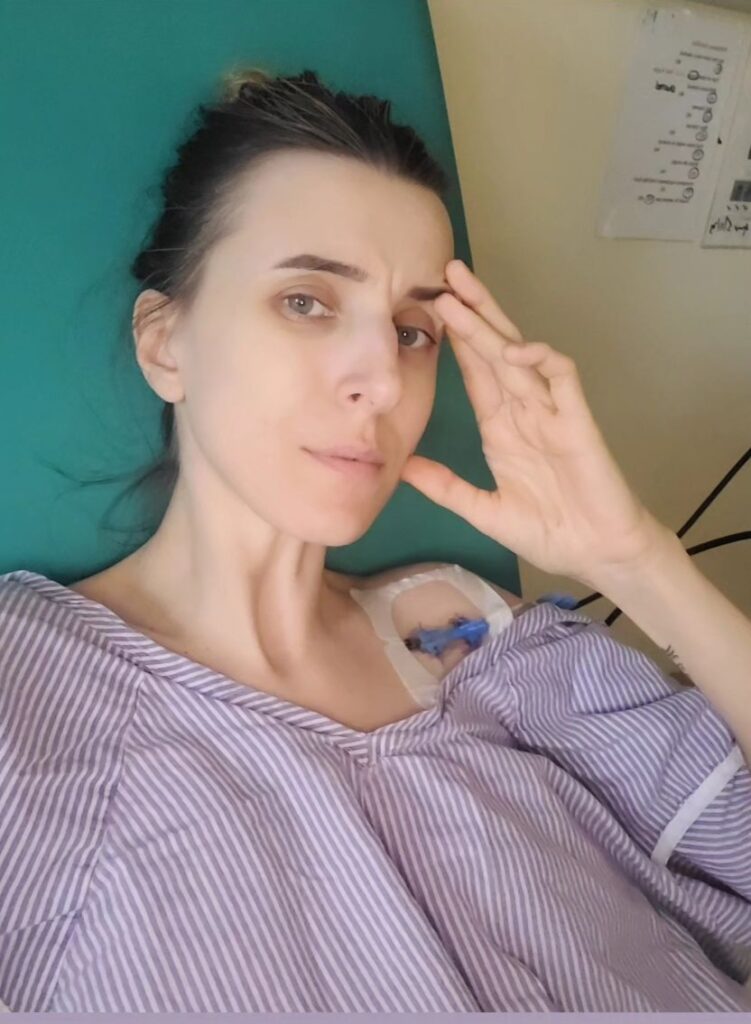
I was like, how can you not take the appendix out? How can you leave this tumor inside of me? Like, you don’t know what it’s doing?
And they were like, it’s doing nothing. It’s been there for a very long time. It’s extremely slow growing, and we’re certain leaving it in is the best thing for us to do until we get the biopsy.
And in hindsight, it was because I have heard cases since I’ve been thrown into the world of pseudomyxoma. I’ve heard cases where they’ve removed the appendix and unfortunately, some of the cells have spread further up the body, and then it’s become a different scenario for people.
So in hindsight, yes, they did me a favor, but it was very strange knowing that they’d found this cancer and they just left it there until I had, you know, the biopsy results.
Delays in receiving the diagnosis
I was told that it would take 2 weeks to get the results back. It ended up taking 6 weeks.
We had to raise a complaint because it just made me spiral.
Every Tuesday they would phone me and say, I’m really sorry we haven’t got your results back. And I’ll be like, but I’m in my bedroom here with the curtains closed, looking at funeral plans because I don’t know what this is or the extent of it.
You’re telling me that it’s nothing. But what if those results show actually you’re wrong and it is something a bit more serious?
So I was in the world of the unknown and I just didn’t know how to process it, what to think, what to do.
I had no motivation. I didn’t want to go out. I just thought, I’m going to die and I need to plan my funeral.
The official diagnosis
And then the 2nd of September is when I finally got the official diagnosis.
So they phoned me, and my partner answered the phone purely because I just didn’t want to answer the phone. If they were going to tell me that they’re not back again.
And my partner, I heard him say, okay, so it’s low grade. And then, yeah, the official diagnosis was that I have something called pseudomyxoma peritonei. It’s a low mucinous neoplasm.
And I asked her, okay, so the surgery is still going to be a right hemicolectomy. And she said, we need to refer you to our colleagues at Basingstoke who specialise in this type of cancer, and they will give you the best treatment that they can.
And I just said, is it going to still be a right hemicolectomy? And she said, I don’t think so. Basingstoke will tell you a little bit more when they get the referral, which we’re going to send shortly.
Colonoscopy
So I got diagnosed properly on the Tuesday.
I had to get a colonoscopy done, just to make sure that my large bowel wasn’t involved in any way.
My scans showed there wasn’t any involvement, but he wanted to be thorough. And, yeah, I had that done, and that was clear.
Because that’s how they found my mom’s bowel cancer. I lost my mum to bowel cancer two years ago.
So I was obviously very terrified of having a colonoscopy, thinking, you know what? If something else comes here to railroad me now and they found a polyp, or there’s something else going on, you’re just very irrational, but it’s so difficult not to be.
Reaction to the diagnosis
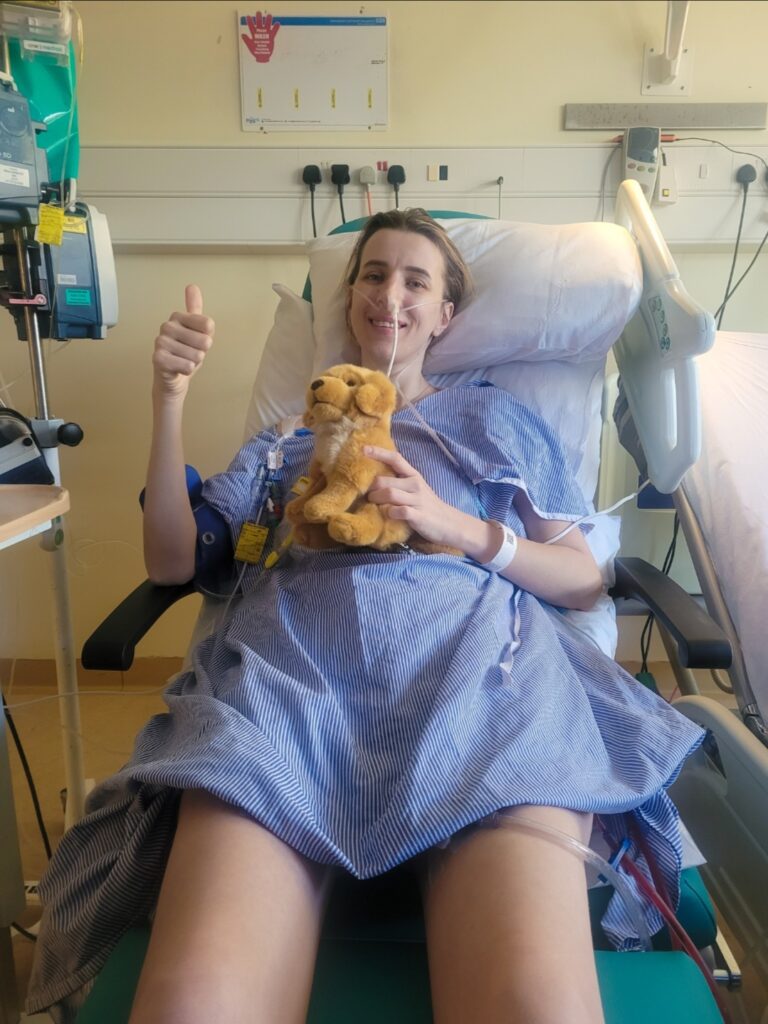
I guess until you’ve heard the word “cancer” yourself, it’s very difficult to imagine how one feels when you hear those words. It’s like the whole ceiling was just closing down on me.
You see, because of my mom’s passing due to her bowel cancer, I was kind of like, oh, okay, here we go again. History is repeating itself.
And there was a mirror directly in front of the bed. And I just looked into the mirror at myself and I just said to my partner, this is it. I’m going to die.
Treatment
Hyperthermic intraperitoneal chemotherapy (HIPEC) surgery
So I underwent something called “mother of all surgery”. Complete cytoreduction surgery, CRS with heated chemotherapy, HIPEC.
The operation took 11 hours, and I had to lose 8 organs to ensure that they got all the cancer out of my body.
So what they do is remove all visible evidence of disease. So in order to do that, I lost my spleen, gallbladder, appendix, ovaries, uterus, womb, fallopian tubes. I had to have a full hysterectomy.
The doctor did say that my ovaries were quite healthy. However, if I do not agree to them taking everything, I’m a ticking time bomb, so they had to go too.
I had to lose my belly button as well. They scraped my diaphragm. They scraped my pelvis from one side of it to another. They took my greater and lesser omentum, which is the fatty apron in your whole abdomen, in your tummy. And they took a little bit of the liver and scraped the liver off for good measure.
And then I had heated chemotherapy applied directly into my tummy—110 Fahrenheit of chemo blasted into me. It’s just a chemotherapy wash to kill out any cells that may be hiding away and can’t be seen with the human eye.
Basically, you’re like a stew on the hob. That’s the only way you can sort of describe it. You’re a slow cooker, you know, they’re just stirring around every 15 minutes.
Quite honestly, I didn’t expect to survive the operation.
On the day that I went down to theatre, I said to my partner, look after the dog. Your mum’s got the Christmas presents.
I did know the mortality rate was extremely low. And the doctor did say that, you know, you’re young, you’re healthy, you don’t smoke, you don’t drink.
I had also worked on fitness well up until the operation, because it’s advised that you really get your protein levels and your muscle built up to give you a head start. So, yeah, obviously building yourself up was advised because that gives you a head start on the recovery.
So I had the operation at 7:30 a.m. on the 1st of November. I believe that my partner got a call maybe about 6:00 or something to say that it was completed maybe 530, 6:00. And that I was in intensive care and they were going to keep me asleep. And they’d phoned him on Thursday to let him know when they’re going to wake me up.
So when I did wake up, I was just like… Oh. Okay. I’m here.
It was a very surreal feeling. I thought, I’m having an out of body experience. Am I not here or am I here? And then I remember feeling that my lips were just extremely dry. My throat was so dry. Obviously I had an NG tube right down my throat, which was really uncomfortable.
And yeah, I just remember saying to the lady, I’m dry, I’m thirsty, I can’t really swallow. And she just said, you’ve got a tube down your throat, so try not to move. I’ll get you a bit of water. And then she just wet my lips with a tissue and told me to just lick the water off my lips, because I couldn’t swallow water straight away.
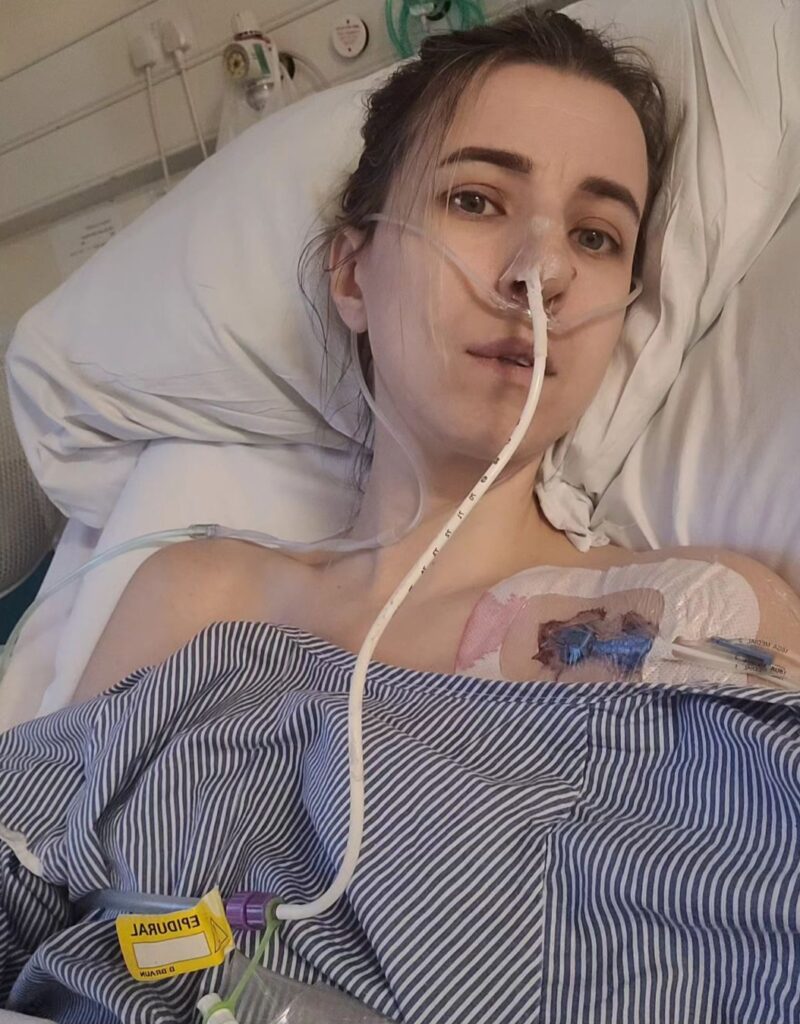
And then she said that your surgeon’s just here waiting to see you. And then he stood by the side of the bed, and they were just asking me questions like, do you know where you are? And I was like, I’m in Basingstoke, the peritoneal malignancy unit. And they’re like, yeah.
And then Alex was like, hey, Fay, do you remember me? And I looked up and I was just like, Alex. I had to feel his arm just to make sure. Like you’re actually here. And he just said the operation went really well. Better than we expected.
And I’m pleased to say that we got it all, and there’s no more cancer.
And at that point I was just like, you got it all. It’s all gone. Like the whole nightmare was just over. And he said, yes, we’ve got it all.
He then said, I’m going to leave you to rest now. Your partner’s on his way.
And, yeah, they just left me in ICU till the Friday evening when they transferred me to the ward where my recovery really did begin.
When I came out of the surgery, I lost 10 kilos. I lost a lot of muscle mass. There was nothing to me. I was just a skeleton.
Recovery from treatment, and moving forward
So I first went to the ward to recover.
I think for the first few days it’s quite a blur, though I do remember some things.
I was on morphine. I had like a PCA where I’d administer my own morphine, just press this button. It would refresh every 12 minutes.
I had an epidural in my lower back. I had bowel stents. I had massaging boots for DVT, blood clots on my legs, which were very noisy and annoying. But therapeutic at the same time to get me to sleep in the evening.
I remember being told that I could have some jelly and soup on day four. They came around with the lunch trolley, and they were wanting to order me a lunch. And I was like, what? Me? No, I can’t eat. And they were like, no, you can, you can have soup and jelly now because you’ve opened your bowels. And I was like, oh, okay.
So it actually felt good to pick up a spoon and feed myself because I had this NG tube up my nose, which was so uncomfortable. I think for me that’s the worst part.
And the chest drains. I had six chest drains. I had two here, two in my waist and two at my pelvis, so they were quite brutal when they pulled them out. A lot of people say like, oh, it doesn’t hurt that much. No, they really do.
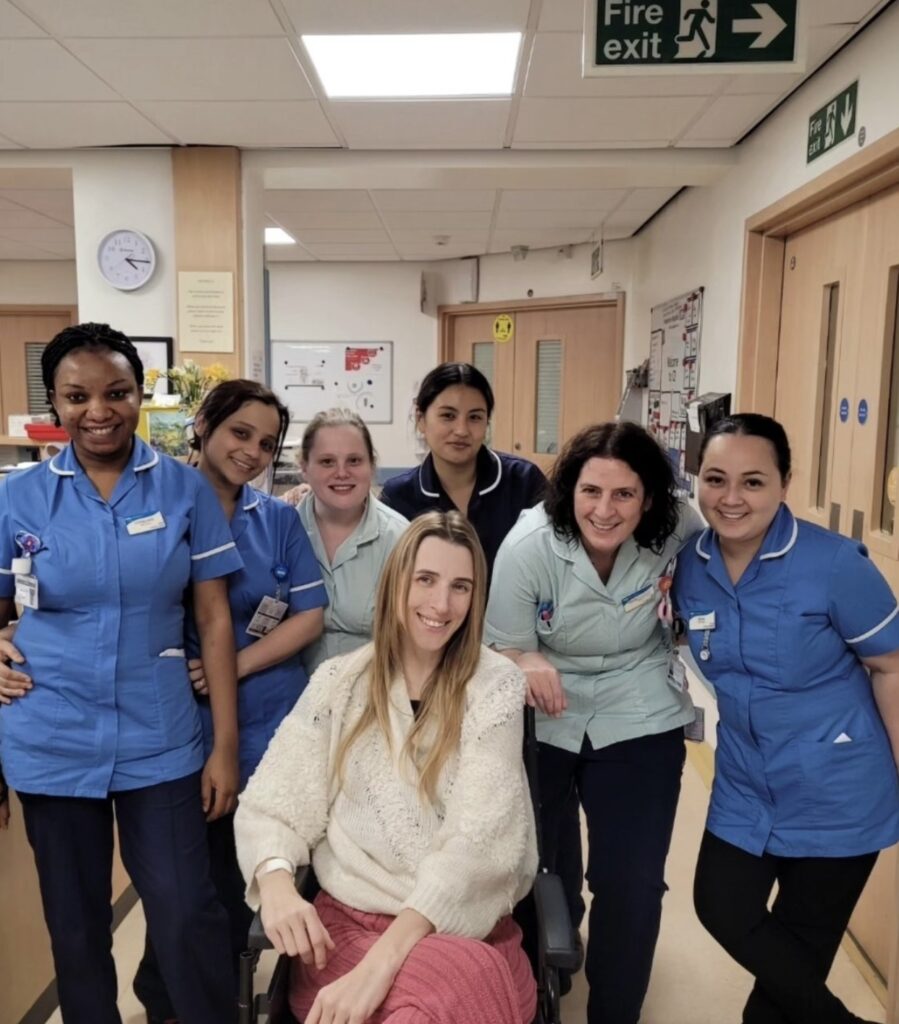
And I just had so many wires and lines and it was just very surreal.
And even more so that I was now there without any cancer because I was on the ward where other women, sadly, have gone in for the same procedure, and there’s 20% of cancer that’s embedded deeper into organs that are too vital, they can’t touch. So they just are on palliative care. So yeah, it’s not a very nice place to be.
Day six. They took my epidural out of my back. And then I was like, oh my God. And they showered me and patted my hair for me because obviously I didn’t have much energy to even lift my arm to clean my teeth.
And then I felt like, wow. Like I feel a different person, like all this stuff’s gone. But boy, that evening did I get the mother of all gas pain? As soon as they had the epidural out, I felt everything. Everything.
I had 14 hours of trapped gas that I was literally begging them to give me more peppermint tea or more peppermint water or painkillers. And they were like, we can’t give you painkillers. It won’t make a difference. You need to try and pass it naturally. But I had a 16-inch scar down my middle from the operation.
And that was that was quite an ordeal, trying to trying to get that gas out that had built up in my tummy. It was really, really painful.
… it’s just about trying to get back to things that you used to love before. Thinking that you can never get them back.
But you will.
How she is doing today
Fast forward to today, and I’m still going through recovery.
On the 1st of June I was seven months post-op. It’s up to 12 months.
So recovery has been very up and down. It’s not linear. It’s quite hard hitting on the body, it’s brutal, not a walk in the park. I’m not going to wrap it up for anyone and say it’s easy, because really it isn’t.
I think I started to feel better, more myself, probably around the 3-month mark. So the surgeon did say to me, for some reason, we don’t know why, but it seems to be between the 8- and 12-week mark that patients suddenly say that they feel that they’re more on the up than before.
I started to get on the exercise bike gradually, as advised by the physio. I did five minutes increasing it to seven minutes, ten minutes. And I have actually gone to 40 minutes now.
I still struggle, you know, I still get a bit of fatigue if I overdo things. Driving my car is a little bit uncomfortable if I drive long distances. I haven’t been able to stand and do any washing up or cooking as of yet. Because I still get a bit of discomfort around the tummy where my scar is. But yeah, I’m getting there.
I mean, I’ve been out with my dog, which was really nice because I didn’t think I’d ever be able to walk him again. And it’s just about trying to get back to things that you used to love before. Thinking that you can never get them back. But you will.
I went back to work. I’m on a phased return. I work at the airport, so it’s quite physical and busy.
Yeah, it’s just the new normal. They call this the new normal. And it’s just about getting to know your body again.
Thankfully, I haven’t had any problem with food. I know a lot of patients have had issues. They can’t have onions, they can’t have steak, they can’t have certain foods. But me, thankfully, I haven’t suffered too badly with food.
When I came out of hospital, it was jelly, ice cream, soup, just liquid, you know, a very low residue diet. So my bowel could just fully recover and just heal. But internally, I’m still healing to this day.
20 years of scans
Some have said that my treatment was like ringing a bell. But it actually isn’t.
I’ve got 20 years of scans. I’ll have scans annually for the first 6 years. And then at the 20 year mark, I’ll skip 1 year at 6 years and go to 8 years, and then it’s 10, and then I believe it’s 14 and then 16 and then 20, I think is when I’m officially cancer free if I’m still OK by then.
So for now, I just get called NED. No evidence of disease. Because they said, you’re not out of the woods just yet.
Trying to process that I’m under scans for 20 years is mentally difficult. It’s like you said, with normal cancers, you’re in remission for 5 years and that’s it. You know, you’re free. Off you go. So yeah, to have 20 years hanging over my head is very difficult to process and get my head around.
However, on the flip side, a lot of people say, at least you’re being under surveillance for 20 years. You know, a lot of us get 5 years and then no more. And then we sit wondering like, oh, okay, I’m on my own now. Am I okay?
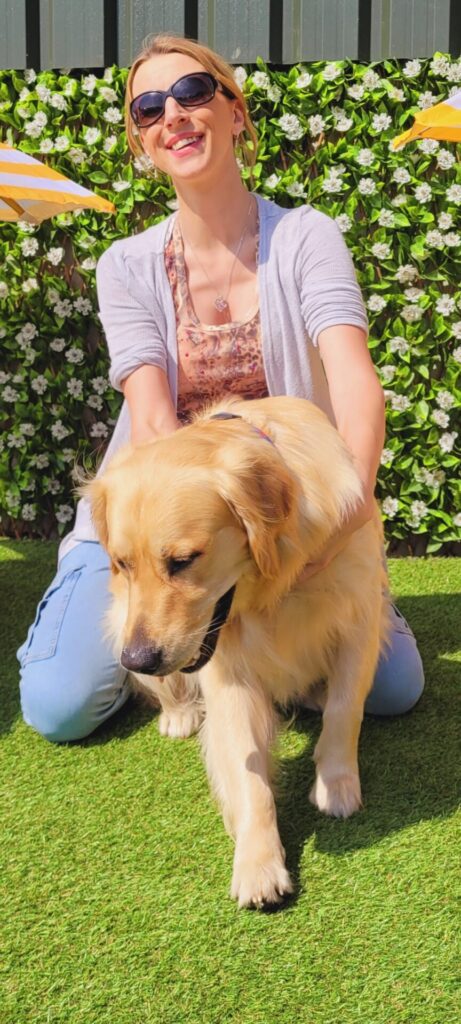
But yeah, I mean, being so young, like age 39, I won’t be declared cancer free till I’m 59. So that for me, is a lot to try and process mentally.
One scan between 39 and 59. One scan could change my whole life again. And then, you know, some people have to have a second surgery. There has been reoccurrence, but there’s 20% get reoccurrence, and that’s across all grades.
I guess I’m lucky that I had low grade, where, you know, it’s not the aggressive type Yeah, it’s very strange trying to get your head around that.
My first scan’s this coming November. I haven’t had any scan since I’ve come out of the surgery, so I’m quite nervous, anxious about this upcoming scan. And I have been since I came home last year in November.
You know, on my first scans coming up now, is it going to show me that they actually got it all, or is there going to be a cell there that was there that’s now had a year to do something, and they’re going to tell me they can see some mucin again on a scan. You just think all these things.
A lot of people say like, don’t look at the future, look at the now. But I think it’s easy for people to say that when they’re not in the situation that I’m in and others are in.
You know, I know people say stuff to try and play it down to make you feel better, but on the flip side, it really doesn’t make you feel better when people try and say to you like, don’t look in the future, look at the now. And it’s like, well, I’m sorry.
My future is, you know, scans for 20 years. And that’s a reality of my life and that’s my future.
No hair loss
I also wanted to share that a lot of people say to me, you didn’t lose your hair. Hey, I had heated chemotherapy blasted directly into my tummy as part of my HIPEC treatment.
Thankfully, I haven’t had to have “proper” chemo because this cancer very rarely or doesn’t really spread through your blood or your lymph nodes. It stays very localized in the abdomen and that area.
Sure, it’s a hard cancer to combat. You have to have the massive surgery to do it. But it’s also one of the easiest cancers to get rid of because it doesn’t usually spread anywhere else like your brain, your lungs and things like that.
So, yeah, you don’t lose your hair with that.
Reflections on her experience

I think with my mum dying from bowel cancer, I always had the fear of cancer. Like, you know, I’m a mum’s daughter. It’s genetic. It’s hereditary in some certain cancers. But I never imagined that I would have it this soon.
So, yeah, my perspective on life just changed massively.
I’ve got no time for people’s drama. I’ve got no time to argue. I just want peace and to just live life.
And, you know, I appreciate waking up every day getting to see flowers or the sky, and it’s just minute little details now that you really do notice. Whereas before you could be like, you know, it’s just a tree. Yeah, it looks pretty. But now it’s like, wow, look at that tree.
You know, you just take in a lot more when you’ve had to fight for your life, which is what I’ve had to do.
… that’s the world that you go in after you’ve had cancer.
You just hope for the best. Really.
Why she’s telling her story
And that’s why I went out and decided to tell my story from my admission into hospital, because when I was diagnosed, there was there was no information for me about this cancer.
I felt very alone and isolated, and I just don’t want people to feel that way.
And anyone that’s newly diagnosed with it now hopefully sees my page or my story and and they will have a better understanding and think, wow, you know, she’s lost 8 organs and look at her, she’s survived. She’s living, she’s cancer free. I can do this as well.
So it’s just about giving someone hope because I think anyone with a cancer diagnosis— that’s all you live on now: hope.
You hope it doesn’t come back. You hope that you get to see your retirement age. You hope that you go forward with your life now without any cancer, and you hope that every yearly scan is clear.
And that’s the world that you go in after you’ve had cancer. You just hope for the best. Really.
Going global
My story has been shared and read all around the world. I mean, I never expected to be global in my wildest dreams.
The press approached me here when I was diagnosed because I’ve got a modeling background. I had quite a following on Instagram. Which is why I decided to spin that now. I don’t want to be the model version of me anymore. I want to go out and spread awareness and use my platform that way.
And when they approached me after I was diagnosed and I just said to them, look, there’s not really any story just yet, you know what? You’re going to have to wait until I’ve got something to tell. Because after undergoing the mother of all surgery, you want to show people that it’s possible that you can survive it and you can come out of it.
So they waited for me. And December, my story dropped with one of the newspapers here as an exclusive. And then that was it.
Next thing my friends are texting and saying, you’re in Tunisia and Turkey and Hong Kong and Brazil and Sao Paulo. And they’re sending me screenshots of the news articles. And I’m like, well, okay, this is insane.
So yeah, I’ve gone global 29 countries and counting. Yesterday I was in the news in Denmark, which a friend showed me.

And I’ve got more media coming. I’ve coming out this month in the UK health magazine. I’ve got radio interviews lined up.
And obviously I’ve done my own reels on my page and Instagram, just about HRT, because obviously I’ve lost all my reproductive system. How it is with the HRT, what women can expect, what the methods are.
I started to do it because like I said, when I was diagnosed, I didn’t know what to expect at Basingstoke. You know, I went in two days before the surgery to prep me and I didn’t know what to expect. So I thought to myself when I was in my room that night, right, I’m going to start vlogging day one. What it’s like here, what I’ve had done day two.
And yeah, just the morning before the surgery and I just carried it on all through my recovery, I’ve been documenting and just vlogging everything and yeah, just to give people hope.
Supporting campaigns

Locally, I’ve also been doing a lot to support campaigns that fight cancer and help fellow patients.
Cancer Research UK are a very big organization here in the UK. They reached out to me and said, you know, we’ve seen your story. We think whoever hears it, it will have an impact on them. So we’d like to bring you in on a campaign.
And now I’m doing race for Life in Brighton. They’ve chosen me to be the face of race for life in Brighton. So I’ll be starting the horn off to sound the race. And I’ll also be doing a little speech on stage on the day. I signed up for a 10-K. I don’t know if I’m going to complete it.
So loads of people have just wanted to bring me on board and it’s great. It really helps to spread the awareness, but show people that we’re not just a statistic.
You can go out and you can still rebuild your life after cancer. Yes. It’s hard. I’m not going to say it’s easy, but it’s all you can do, right?
We’re still living. We’re still breathing. So just enjoy it.
… just have the faith that our bodies are stronger than we realize.
… my body has done amazing work and still is doing amazing work to get me where I need to be.
Closing message
So my message to people that are watching this is yes, it’s scary. Yes, it’s overwhelming. And it’s fearful. But you know, you’re not alone in those feelings.
Anyone that has been down this road, all your feelings are valid through the whole of your journey. You know, it’s how you feel about it. So don’t let anyone tell you any different.
If you need to cry, cry. If you need to scream, scream. But just have the faith that our bodies are stronger than we realize.
And I’ve learned that going through this major surgery that my body has done amazing work and still is doing amazing work to get me where I need to be. So never give up.
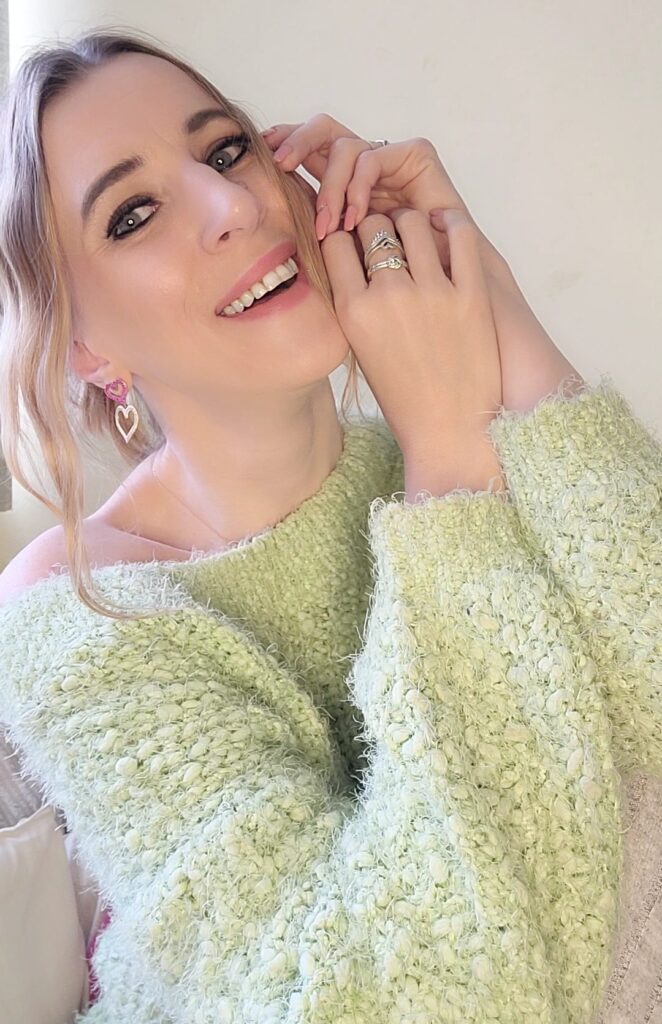
I’m also going out to show people that cancer’s not pretty.
You know, I documented when I was in hospital crying all through my recovery. Like, this is brutal. I can’t cope. And it’s important because I think I’ve had the modeling background.
People just think, oh, you know, pretty girl, images are photoshopped and edited. Of course they are photographers’ and editors’ images. But it’s important to show people the reality of it, as much as it’s hard hitting and it can be triggering for some people to see.
And that’s what I think will help people, especially newly diagnosed people in the future.
“My God, it is a journey. But she got there. So hopefully I will, too.”

Inspired by Faye's story?
Share your story, too!
Related Cancer Stories
More Appendix Cancer Stories
Lindsay B.
Symptoms: Increasing urge to urinate
Treatment: Cytoreductive surgery (CRS) and Hyperthermic Intraperitoneal Chemotherapy (HIPEC)
Faye L., Pseudomyxoma peritonei (rare appendix cancer)
Symptoms: Severe bloating, bad stomachache, elevated CA 125 and tumor markers
Treatments: Hyperthermic intraperitoneal chemotherapy with mitomycin C (HIPEC) surgery; removal of spleen, gallbladder, appendix, ovaries, uterus, womb, fallopian tubes, belly button
